- Home
- Lauren Oliver
Delirium Page 24
Delirium Read online
Page 24
Page 24
floating oval faces, different shades of brown and pink, two-dimensional, like shaded drawings. I am not afraid this time. I don’t feel anything.
I answer all the questions exactly as I should. When I am asked to give my favorite color, for just the briefest, tiniest of seconds my mind flashes on a sky the color of polished silver, and I think I hear a word— gray — whispered quietly into my ear.
I say, “Blue,” and everyone smiles.
I say, “I’d like to study psychology and social regulation. ” I say, “I like to listen to music, but not too loudly. ” I say, “The definition of happiness is security. ”
Smiles, smiles, smiles all around, a room full of teeth.
After I’m done, as I am leaving, I think I see a shifting shadow, a flicker in my peripheral vision. I glance up quickly at the observation deck. Of course, it’s empty.
Two days later we receive the results of my boards—all passes—and my final score: Eight. My aunt hugs me, the first time she has hugged me in years. My uncle pats me on the shoulder awkwardly and gives me the largest piece of chicken at dinner. Even Jenny looks impressed.
Gracie rams the top of her head into my leg, one, two, three times, and I step away from her, tell her to stop fussing. I know she’s upset that I’ll be leaving her.
But that’s life, and the sooner she gets used to it, the better.
I receive my “Approved Matches” too, a list of four names and statistics— age, scores, interests, recommended career path, salary projections—printed neatly on a white sheet of paper with the Portland city crest at its top. At least Andrew Marcus isn’t on it. I recognize only one name: Chris McDonnell. He has bright red hair and teeth that stick out like a rabbit’s. I only know him because once when I was playing outside last year with Gracie, he started chanting, “There goes the retard and the orphan,” and without really thinking about what I was doing, I scooped up a rock from the ground and turned around and hurled it in his direction.
It caught him on the temple. For a second his eyes crossed and uncrossed. He lifted his fingers to his head, and when he pulled them away they were dark with blood. For days afterward I was terrified to go out, terrified I’d be arrested and thrown in the Crypts. Mr.
McDonnell owned a tech services firm, and was a volunteer regulator besides. I was convinced he would come after me for what I’d done to his son.
Chris McDonnell. Phinneas Jonston. Edward Wung.
Brian Scharff. I stare at the names for so long that the letters rearrange themselves into nonsense words, into baby babble. Gone Crap, Just Fine, Won’t Spill, Pick Chris, Sharp Things.
In mid-July, when my procedure is only seven weeks away, it’s time to make my decision. I rank my choices arbitrarily, inserting numbers next to names: Phinneas Jonston (1), Chris McDonnell (2), Brian Scharff (3), Edward Wung (4). The boys will be submitting their rankings too; the evaluators will do their best to match preferences.
Two days later I receive the official notification: I’ll be spending the rest of my life with Brian Scharff, whose hobbies are “watching the news” and “fantasy baseball,”
and who plans to work “in the electricians’ guild,” and who can “someday expect to make $45,000,” a salary that “should support two to three kids. ” I’ll be pledged to him before I begin Regional College of Portland in the fall.
When I graduate we’ll be married.
At night I sleep dreamlessly. In the mornings I wake to fog.
Chapter Twelve
“In the decades before the development of the cure, the disease had become so virulent and widespread it was extraordinarily rare for a person to reach adulthood without having contracted a significant case of amor deliria nervosa (please see “Statistics, Pre–Border Era”).
. . . Many historians have argued that pre-cure society was itself a reflection of the disease, characterized by fracture, chaos, and instability. . . . Almost half of all marriages ended in dissolution. . . . Incidence of drug use skyrocketed, as did alcohol-related deaths.
People were so desperate for relief and protection from the disease they began widespread experimentation with makeshift folk remedies that were in themselves deadly, consuming concoctions of drugs assembled from common cold medications and synthesized into an extremely addictive and often fatal compound (please see “Folk Cures Through the Ages”). . . .
The discovery of the procedure to cure deliria is typically credited to Cormac T. Holmes, a neuroscientist who was a member of the initial Consortium of New Scientists and one of the first disciples of the New Religion, which teaches the Holy Trinity of God, Science, and Order. Holmes was canonized several years after his death, and his body was preserved and displayed in the All-Saints’ Monument in Washington, DC (see photographs on pp. 210–212). ”
—From “Before the Border,” A Brief History of the United States of America, by E. D. Thompson, p. 121
One hot evening toward the end of July I’m walking home from the Stop-N- Save when I hear someone call my name. I turn around and see Hana jogging up the hill toward me.
“So what?” she says as she gets closer, panting a little.
“You’re just going to walk by me now?”
The obvious hurt in her voice surprises me. “I didn’t see you,” I say, which is the truth. I’m tired. Today we did inventory at the store, unshelving and reshelving packages of diapers, canned goods, rolls of paper towels, counting and recounting everything. My arms are aching, and whenever I close my eyes I see bar codes.
I’m so tired I’m not even embarrassed to be out in public wearing my paint-spotted Stop-N-Save T-shirt, which is about ten sizes too big for me.
Hana looks away, biting her lip. I haven’t spoken to her since that night at the party and I’m searching desperately for something to say, something casual and normal. It suddenly seems incredible to me that this was my best friend, that we could hang out for days and never run out of things to talk about, that I would come home from her house with my throat sore from laughing. It’s like there’s a glass wall between us now, invisible but impenetrable.
I finally come up with, “I got my matches,” at the same time that Hana blurts out, “Why didn’t you call me back?”
Both of us pause, startled, and then again start up at the same time. I say, “You called?” and Hana says, “Did you accept yet?”
“You first,” I say.
Hana actually seems uncomfortable. She looks at the sky, at a small child standing across the street in a baggy swimsuit, at the two men loading buckets of something into a truck down the street—everywhere but at me. “I left you, like, three messages. ”
“I never got any messages,” I say quickly, my heart speeding up. For weeks I’ve been pissed that Hana didn’t try to reach out to me after the party—pissed, and hurt. But I told myself it was better this way. I told myself Hana had changed, and she probably wouldn’t have much to say to me anymore.
Hana is looking at me like she’s trying to judge whether I’m telling the truth. “Carol didn’t tell you that I called?”
“No, I swear. ” I’m so relieved I laugh. In that second, it hits me just how much I’ve missed Hana. Even when she’s mad at me, she’s the only person who’s ever really looked out for me by choice, not because of family obligation and duty and responsibility and all the other stuff that The Book of Shhh says is so important.
Everyone else in my life—Carol and all my cousins, the other girls at St. Anne’s, even Rachel—have only spent time with me because they had to. “I had no idea. ”
Hana doesn’t laugh, though. She frowns. “No worries.
It’s no big deal. ”
“Listen, Hana—”
She cuts me off. “Like I said, it’s no big deal. ” She crosses her arms and shrugs. I don’t know whether she believes me or not but it’s clear that, after all, things are different. This isn’t going to be some big, happy reunion. “So you g
ot matched?”
Her voice is polite now, and slightly formal, so I take on the same tone. “Brian Scharff. I accepted. You?”
She nods. A muscle flexes at the corner of her mouth, almost imperceptible. “Fred Hargrove. ”
“Hargrove? Like the mayor?”
“His son. ” Hana nods, looks away again.
“Wow. Congratulations. ” I can’t help sounding impressed. Hana must have killed at the evaluations.
Not that that’s any surprise, really.
“Yeah. Lucky me. ” Hana’s voice is completely toneless. I can’t tell if she’s being sarcastic. But she is lucky, whether she knows it or not.
And there it is: Even though we’re standing in the same patch of sun- drenched pavement, we might as well be a hundred thousand miles apart.
You came from different starts and you’ll come to different ends : That’s an old saying, something Carol used to repeat a lot. I never really understood how true it was until now.
This must be why Carol didn’t tell me Hana called. Three phone calls is a lot of phone calls to forget, and Carol’s pretty careful about stuff like that. Maybe she was trying to hurry up the inevitable, skip us both to the ending, the part where Hana and I aren’t friends anymore. She knows that after the procedure— once the past and all our shared history has loosened its grip on us, once we don’t feel our memories so much—we won’t have anything in common. Carol was probably trying to protect me, in her own way.
There’s no point in confronting her about it. She won’t try and deny it. She’ll just give me one of her blank looks and rattle off a proverb from The Book of Shhh.
Feelings aren’t forever. Time waits for no man, but progress waits for man to enact it.
“You walking home?” Hana is still looking at me like I’m a stranger.
“Yeah,” I say. I gesture to my T-shirt. “I figured I should probably get inside before I blind someone with this. ”
A smile flits over Hana’s face. “I’ll walk with you,” she says, which surprises me.
For a while we walk in silence. We’re not that far from my house, and I’m worried we’ll go the whole way back without speaking at all. I’ve never seen Hana so quiet, and it’s making me nervous.
“Where are you coming from?” I say, just to say something.
Hana starts next to me, as though I’ve woken her from a dream. “East End,” she says. “I’m on a strict tanning schedule. ”
She presses her arm next to mine. It’s at least seven shades darker than mine, which is still pale, maybe a little more freckled than it is in the winter. “Not you, huh?” This time she smiles for real.
“Um, no. Haven’t gotten down to the beach very much. ”
I will away a blush.
Thankfully, Hana doesn’t notice, or if she does she doesn’t say anything. “I know. I was looking for you. ”
“You were?” I shoot her a look from the corner of my eye.
She rolls her eyes. I’m glad to see her attitude is coming back online. “I mean, not actively. But I’ve been down there a few times, yeah. Haven’t seen you. ”

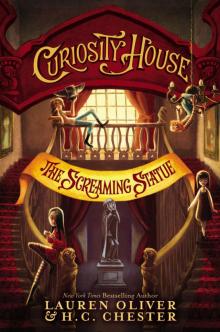 The Screaming Statue
The Screaming Statue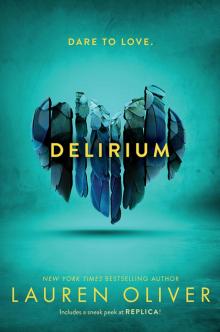 Delirium
Delirium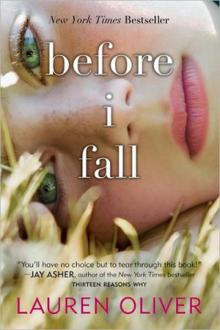 Before I Fall
Before I Fall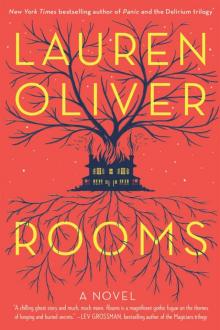 Rooms
Rooms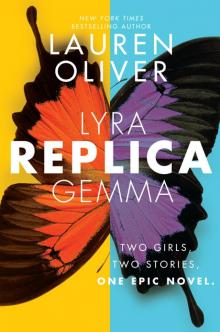 Replica
Replica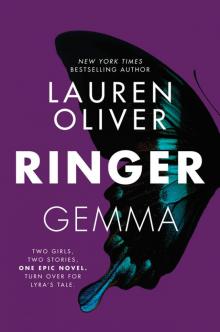 Ringer
Ringer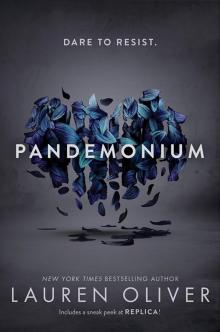 Pandemonium
Pandemonium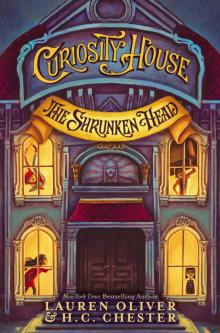 The Shrunken Head
The Shrunken Head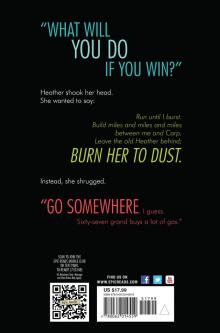 Panic
Panic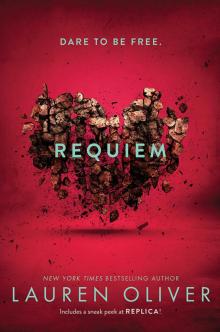 Requiem
Requiem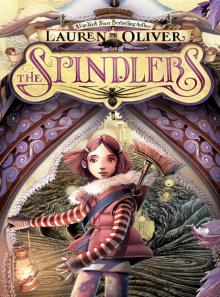 The Spindlers
The Spindlers Annabel
Annabel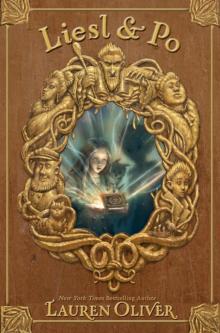 Liesl & Po
Liesl & Po Raven
Raven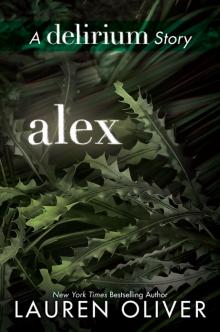 Alex
Alex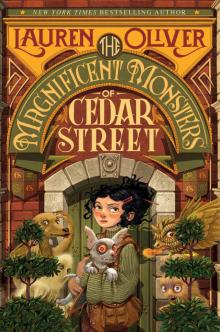 The Magnificent Monsters of Cedar Street
The Magnificent Monsters of Cedar Street Vanishing Girls
Vanishing Girls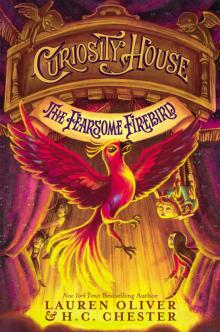 The Fearsome Firebird
The Fearsome Firebird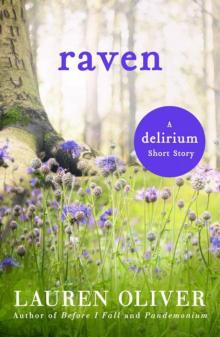 Raven: A Delirium Short Story
Raven: A Delirium Short Story Annabel: A Delirium Short Story
Annabel: A Delirium Short Story Hana: A Delirium Short Story
Hana: A Delirium Short Story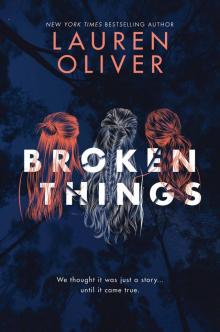 Broken Things
Broken Things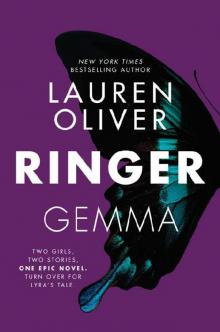 Ringer (Replica)
Ringer (Replica) Alex (delirium)
Alex (delirium)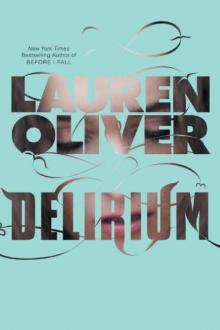 Delirium dt-1
Delirium dt-1